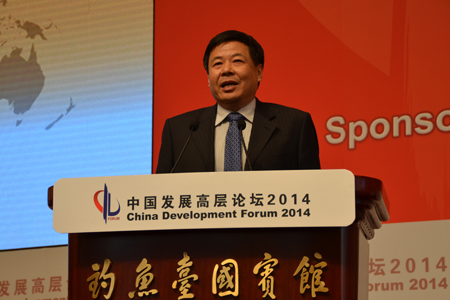
25 Mar, 2014
China identifies six major uncertainties facing global economy
Beijing, (People’s Daily Online) March 24, 2014 – The global economy in 2014 is fraught with six major uncertainties, said Zhu Guangyao, Vice Minister of Finance, when delivering a speech at the “2014 Global Economic Outlook” session of the “China Development Forum 2014” in Beijing, March 22, 2014. These six uncertainties are : The Fed’s monetary policy tendency, Europe’s economic situation, Japan’s economic development, emerging market economy, new geopolitical challenges, and global economic policies.
Firstly, the Fed’s monetary policy tendency. The Fed announced that it would continue the quantitative easing (QE) exit policy, which is critical in its expectation adjustment. According to the current pace, The Fed will complete the QE exit at the Fed meeting in October this year. Meanwhile, The Fed would no longer use a 6.5% unemployment rate threshold as a determinant for raising interest rates.
 |
| Zhu Guangyao, Vice Minister of Finance, delives a speech at the “Global Economic Outlook in 2014” session of the “China Development Forum 2014” in Beijing, March 22, 2014.(People’s Daily Online) |
Secondly, Europe’s economic situation. Despite that Europe has made significant progress in economic recovery and the introduction of a unified financial regulatory system, its structural reform is still not in place, many European countries face new challenges including unemployment and social affordability.
Thirdly, the uncertainty of Japan’s economic development. The Japanese government will raise the consumption tax rate from 5% to 8% on April 1, 2014. Raising taxes is a daunting challenge for all countries.
At the same time, to ensure the economy not gets affected, Japan plans to implement a 5.5 trillion yen economic stimulus plan when raising the tax rate. However, the previous economic stimulus plans basically had no complete implementation results, so Japan’s fiscal stimulus plan faces challenges. In addition, the “third arrow” of Abenomics is based on Japan-US negotiations on TPP, especially the agricultural issue, which will be a challenge for Japan’s political system.
Fuorthly, the uncertainties in the development of emerging market economy. Since The Fed began to exit QE last May, markets get shaken in emerging market countries. Currently, differentiation trends appear in many emerging market countries. Through structural adjustments, India, Brazil, and Indonesia have significantly improved the situation, but they also paid a heavy price in the structural reforms. Turkey, South Africa, and Russia have relatively bigger difficulties in their economic structure problems.
Fifthly, the global economy faces new geopolitical challenges, especially the current situation in Ukraine, having uncertain impacts on Ukraine, Russia, Europe, and the global economy. International Monetary Fund IMF is studying the economic rescue plan for Ukraine; at least 30 to 35 billion dollars are needed to achieve the country’s economic stability. However, the IMF has to undergo a difficult process when forming a resolution and it will be a big challenge for Ukraine whether to accept the attached requirements.
Finally, the uncertainty of global economic growth through analysis of global economic policies, including the uncertainty of overall global economic growth, the uncertainty of economic policies after the U.S. exit QE, the uncertainty of IMF’s dealing with structural adjustment, reform, and coping with possible crises elsewhere in the world. “IMF reform program was designed in 2010, the future program needs our joint efforts,” Zhu said.
The article is edited and translated from 《中国副财长朱光耀:世界经济面临六大不确定性》



Liked this article? Share it!